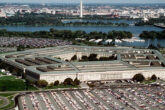February 22, 2018
Averting the U.S.-Russia Warpath
For nearly twenty years following the end of the Cold War, military confrontation between the United States and the Russian Federation seemed implausible. Even during periods of tension, as during the Kosovo crisis in the late 1990s, few believed that disagreement between Washington and Moscow could lead to a serious crisis, no less war. Before the first decade of the new century had passed, however, Russian officials were accusing the United States of working to isolate Russia. Such apprehensions have mounted steadily in Russia in the years since. At the same time, Russian behavior, including interventions in Ukraine and Syria, military posturing and harassment in Europe, and interference in Western elections, has led many in the United States to conclude that, while a U.S.-Russian conflict is by no means inevitable, the risk of such a confrontation is growing.
Even as U.S.-Russian tensions have risen, fundamental shifts in the military-technological environment threaten to erode strategic stability between the two nations. In the coming years, both sides’ extensive dependence on information technology, coupled with likely perceptions of lower risk for the use of “nonkinetic” and nonlethal attacks, are creating new incentives to use cyber and/or counterspace weapons early in a crisis or conflict. At the same time, the advent of novel cyber, counterspace, precision-strike, missile-defense and autonomous military systems could cause one or both nations to lose confidence in their nuclear second-strike capabilities—thereby eroding the stability afforded by mutually assured destruction.
Read the full article in The National Interest.
More from CNAS
-
Lessons in Learning
Executive Summary Although claims of a revolution in military affairs may be overhyped, the potential for artificial intelligence (AI) and autonomy to change warfare is growin...
By Josh Wallin
-
The Pentagon Push to Change an “Antiquated” System
Carlton Haelig, a fellow at the Center for a New American Security, joined The Cipher Brief to discuss the systems in place in the Department of Defense and the challenges ass...
By Carlton Haelig
-
The Department of Defense’s Breakthrough Nuclear Moment Risks Slipping Away
Unless they act, the Department of Defense’s breakthrough nuclear moment may vanish before it really happens....
By Will Rogers
-
DEFAERO Strategy Series [Apr 09, 25] CNAS' Becca Wasser and Phil Sheers on Revitalizing the U.S. Defense Industrial Base
On this episode of the Defense & Aerospace Report Strategy Series, sponsored by General Atomics Aeronautical Systems, Becca Wasser and Phil Sheers of the Center for a New Amer...
By Becca Wasser & Philip Sheers




